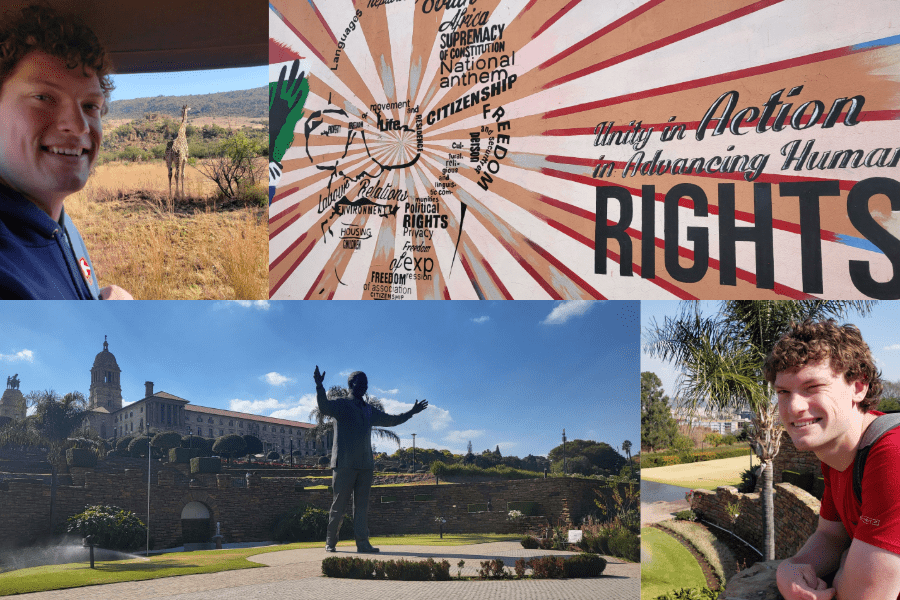Finance major Kaden Wagner ’24 is developing an interactive and collaborative annotation tool this summer to advance the understanding of the South African Truth and Reconciliation process as part of the Summer Creative Arts and Research Program (SCARP).
Wagner, who traveled to South Africa this summer where he performed research and interviewed people who experienced apartheid firsthand, is working closely with faculty mentor and Etown Assistant Professor of English Literature Patrick Allen to build a website that houses annotated Truth and Reconciliation Commission (TRC) documents, offers annotation tutorials, and provides educational resources on apartheid. Their aim for the project is to provide students and professional scholars with an accessible, navigable resource.
Title of Research
The Letter Versus the Spirit of the Law Post-Apartheid: Building an Interactive DH Website on Truth and Reconciliation in South Africa
Student Researcher
Kaden Wagner ’24 (Finance major)
Faculty Mentor
Patrick Allen, Assistant Professor of English Literature
What are you researching?
Wagner: It’s been my privilege to begin the foundational work on creating an educational guide to apartheid in South Africa and specifically a platform for annotating and learning about the Truth and Reconciliation Committee’s (TRC) report created post-apartheid. My work has been foundational in that I’ve set up a website to house the annotated documents, as well as providing tutorials for creating annotations and resources for learning and understanding apartheid in South Africa. To be included in the website and my presentations on the project are the information and pictures I was able to procure recently on an international trip to South Africa. This information includes what I learned from attending the South African Historical Society’s (SAHS) recent conference at the University of Johannesburg concerning South African history and its effects on the present. Also included will be what I learned on tours, from museums, and from visiting key sites, much of which I was able to photograph. Moving forward, I will continue to improve the website and integrate information and resources from my research and trip.
Why did you choose this topic?
Wagner: I intend to go to law school after I graduate from Etown, and my topic immediately piqued my interest because of the legal aspect of the occurrences during and after the transition in South Africa from a political system of apartheid to democracy. This process did not involve strict punishment of all offenders but rather amnesty for some with the goal of transparency and reconciliation for the nation, provided some conditions listed by the TRC. This is what inspired the project’s title of the letter versus the spirit of the law, as I get the opportunity to investigate one of the most recent, well-documented, and horrendous periods of human rights violations and how South Africa sought to improve during that time to progress itself as a nation. I get to ask questions like “How would I go about creating reconciliation and peace after so much hurt?” and “How can the law be understood and used to try to right the wrongs of the past?” as well as being able to challenge future students and scholars on these questions with the website.
What was the most interesting aspect of this research?
Wagner: The most interesting part of my work this summer has been traveling to South Africa and immersing myself as much as possible in today’s culture while learning about the recent past. I had the unique opportunity to learn from historians and professors at SAHS’s conference, explore the city to see the places spoken about, and meet the welcoming people.
What are you hoping to accomplish through this research?
Wagner: Through this project, I hope to make learning about apartheid in South Africa simpler, more concrete, and more approachable for other students and interested scholars like myself. I also hope to challenge myself and others, if not about the role of law in this process, about reconciliation and peace on a mass scale as well as in their own lives.
Talk about working with your mentor. How have they helped you throughout this experience?
Wagner: Dr. Patrick Allen has helped guide me as I work on this project. Initially, our ideas for the project were very abstract, and working remotely without his collaboration would have been a challenging work process. Dr. Allen has shown me how to formulate some of my ideas for the project, as well as being clear about his expectations of what he would like to see. He has spent a great deal of time thinking about and interacting with the different elements of the project, and he wants to see both it and I succeed.
Hear from the faculty mentor — Patrick Allen
“It’s been fantastic seeing how Kaden is bringing our fledgling project to life. As we conceived of our project, we had grand visions that neither of us had tried before, and Kaden has done wonderful work making it happen. He’s ambitious, which is important for this kind of ground-level project – and has developed an interest in South African apartheid and Truth and Reconciliation. Since Kaden plans to study law after graduating from Etown, traveling to Johannesburg, South Africa; interviewing people who experienced apartheid firsthand; and examining the legal apparatuses that brought about apartheid’s end will all help him to develop a unique point of view that will set him apart from other law school applicants.
“Whenever we run into roadblocks or questions, Kaden digs in and gets the issues solved. He’s developing an excellent website, archive, and collaborative annotation tool that will initially become a critical piece of my course on South African literature and that we imagine will grow into an accessible resource for students, teachers, and scholars anywhere who are interested in Truth and Reconciliation.”

